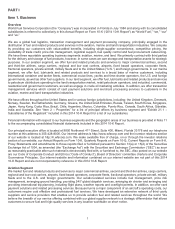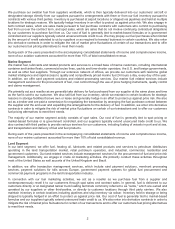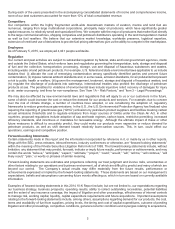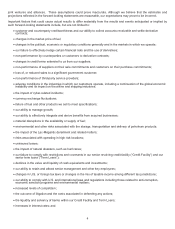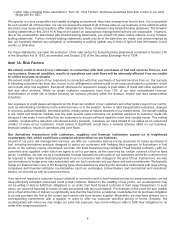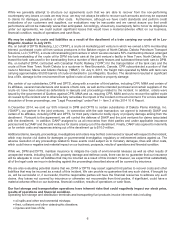World Fuel Services 2014 Annual Report Download - page 16
Download and view the complete annual report
Please find page 16 of the 2014 World Fuel Services annual report below. You can navigate through the pages in the report by either clicking on the pages listed below, or by using the keyword search tool below to find specific information within the annual report.11
• technological advances affecting energy consumption or supply;
• energy conservation efforts;
• price and availability of alternative fuels; and
• weather.
If fuel prices increase, our customers may not be able to purchase as much fuel from us because of their credit limits with
us and the resulting adverse impact on their business could cause them to be unable to make payments owed to us for fuel
purchased on credit. They may also choose to reduce the amount of fuel they consume in their operations to reduce costs
or comply with new environmental regulations to obtain associated incentives. For example, in the shipping industry a
number of container ships are sailing at reduced speeds, known as “slow steaming,” to conserve fuel and reduce carbon
emissions. In any such event, there can be no assurance that the volume of orders from our customers will increase again
or that we will be able to replace lost volumes with new customers. In addition, if fuel prices increase, our own credit limits
could prevent us from purchasing enough fuel from our suppliers to meet our customers’ demands or could require us to
prepay for fuel purchases which would impair our liquidity.
We also maintain fuel inventories for competitive or logistical reasons. Because fuel is a commodity, we have no control
over the changing market value of our inventory. Our inventory is valued using the average cost methodology and is stated
at the lower of average cost or market. A rapid decline in fuel prices could cause our inventory value to be higher than
market, resulting in our inventory being marked down to market or the inventory itself sold at lower prices. While we attempt
to mitigate these fluctuations such as these through hedging, there can be no assurance that such hedges will be effective.
Accordingly, if the market value of our inventory is less than our average cost and to the extent our hedges are ineffective,
we would record a write down of inventory and a non-cash charge to cost of revenue, which would adversely impact our
earnings.
Economic, political and other risks associated with international sales and operations could adversely affect our
business and future operating results.
Because we offer fuel products and services on a worldwide basis, our business is subject to risks associated with doing
business internationally. Our business and future operating results could be harmed by a variety of factors, including:
• trade protection measures and import, export and other licensing requirements, which could increase our costs or
prevent us from doing certain business internationally;
• the costs of hiring and retaining senior management for overseas operations;
• difficulty in staffing and managing widespread operations, which could reduce our productivity;
• unexpected changes in regulatory requirements, which may be costly and require significant time to implement;
• laws restricting us from repatriating profits earned from our activities within foreign countries, including the payment
of distributions;
• governmental actions that may result in the deprivation of our contractual rights or the inability to obtain or retain
authorizations required to conduct our business;
• political risks specific to foreign jurisdictions; and
• terrorism, war, civil unrest and natural disasters.
In particular, we operate in certain international markets which have been plagued by corruption and have uncertain
regulatory environments, either of which could have a negative impact on our operations there. Furthermore, many countries
in which we operate have historically been, and may continue to be, susceptible to recessions or currency devaluation.
We also operate in certain high risk locations that have been experiencing military action or continued unrest which could
disrupt the supply of fuel or otherwise disrupt our operations in those areas. In these high risk locations, we may also incur
substantial operating costs, including maintaining the safety of our personnel. Furthermore, we cannot guarantee the safety
of our personnel in these locations and there is a risk of serious injury or loss of life of employees or subcontractors.
Due to our international operations, we are subject to U.S. and international laws, including U.S. economic
sanctions, the Foreign Corrupt Practices Act (“FCPA”) and similar anti-bribery laws, which can impose significant
compliance costs and subject us to civil or criminal penalties for non-compliance.
Doing business on a worldwide basis requires us to comply with the laws and regulations of the U.S. government and
various international jurisdictions. These regulations place restrictions on our operations, trade practices and partners and
investment decisions. In particular, our international operations are subject to U.S. and foreign anti-corruption laws and
regulations, such as the Foreign Corrupt Practices Act (“FCPA”) and the U.K. Anti Bribery Act, and economic sanction
programs administered by the U.S. Treasury Department’s Office of Foreign Assets Control (“OFAC”). The FCPA prohibits
us from providing anything of value to foreign officials for the purposes of influencing official decisions or obtaining or


